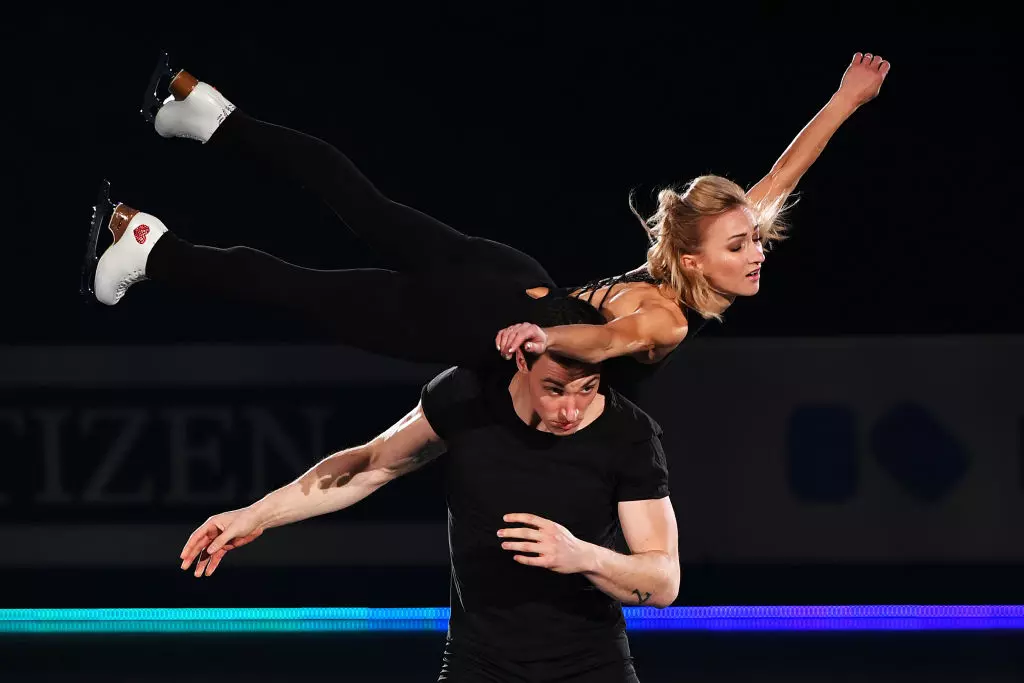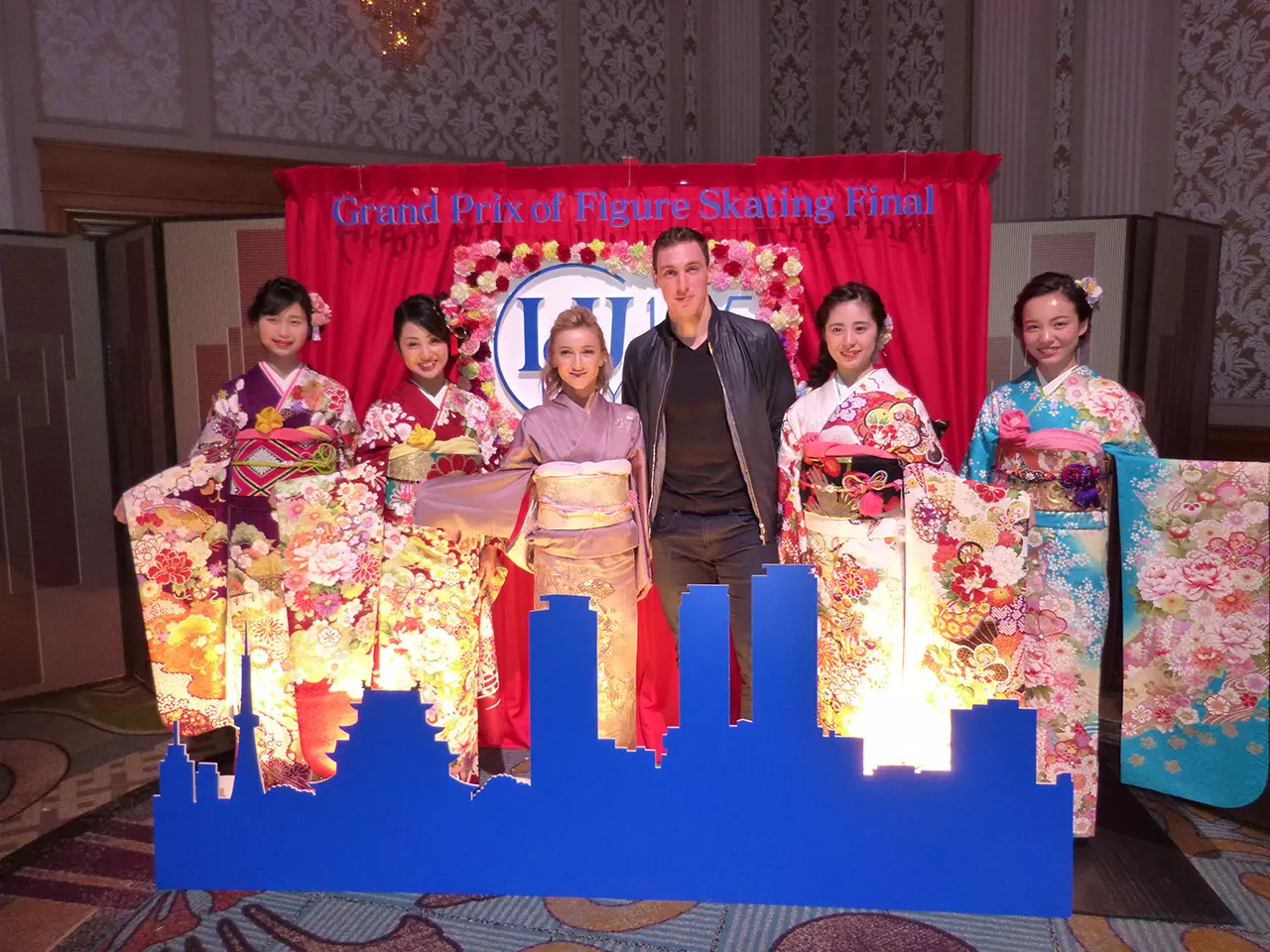
Germany’s Aljona Savchenko and Bruno Massot struck gold at the Grand Prix Final in Nagoya (JPN) and set a new highest score in the Free Skating.
A = Aljona Savchenko, B = Bruno Massot, Q = interviewer Tatjana Flade for the ISU
Q: How did you feel in your Free Skating at the Grand Prix Final?
B: The more we advanced in the program, the more energy we had. We gave more and more, because the audience pushed us so much, it was amazing. When one element after the other worked, it could give us only new energy and we had to stay focused, because we started to feel this big joy. The last lift was to come and I concentrated again, because I knew there is just this one lift left and it would not be a good moment to miss it. The feeling was just awesome, I can’t find words to describe it.
A: I thought that the fans gave us great support, we also had a standing ovation in the Short Program. This motivates you to do even better. I wish we would have had more time in the Free Skating to enjoy it. It was over so fast that I didn’t even realized what happened.
Q: You think your Free Skating could have been longer?
B: (shakes his head and grins)
A: Yes. Maybe it was because I could not sleep very well in Japan. I fell asleep on the bus on the way to the rink and I had to fight with myself to wake up. When we got into our starting pose I told myself, ‘you have to be here now’. In the warm up I barely could lift my arms, I was like in my sleep. The time difference did affect me.
B: These competitions one after the other, from the USA back to Europe and then travelling to Asia was a bit hard.
A: Somehow I knew that we will skate well. It was like in practice. We’ve skated programs like this in practice, even better ones. You get that feeling – today it could work out. This is what you wish for and then it happened exactly like you wished for. It was a magical moment.
Q: So you felt very confident going into the Free Skating.
B: Yes, I was very confident and I knew we would skate well.
A: I already felt like that before the Short Program. Actually, at Skate America I felt the same way, but you are always learning something new. Our program was good in Lake Placid, but not as good as at the Final. Some things might have been better in Lake Placid, though. You feel secure, but you need to keep your focus to do everything the way you want to do. Sometimes you think it is easy and then it is not easy or the other way round. It is always a challenge for you to show on the ice what you want to do.
Q: You set a new record score in the Free Skating.
B: Yes, and we’re only point off the total record score.
A: It was about time (laughs). It is nice that we were able to do that.
B: Before we skated, I saw the marks of the Chinese team (Wenjing Sui/Cong Han) and I thought, we need to skate really well. When we went out onto the ice, I knew we’ll nail everything. We didn’t miss a thing in practice in the past few days. We knew that we’ll do it, but I didn’t think that we’ll get such a high score.
A: However, even if your practice is not as good, you can still skate a good program. It really depends on the situation and how you feel and what you think. I didn’t see the score (of Sui/Han), it does not matter to me if they have a high score or not. I have to do my job anyway. I don’t have anything to lose – just give your best and enjoy the moment. Sometimes I am watching the scores of others, but sometimes you don’t have time and you don’t want to occupy yourself with other people. Sometimes you just see the results on the screen by accident, but this time I was in the dressing room, getting my skates on. When I went out, Tarasova/Morozov were already half way through.
Sometimes you are ready early and you get bored, then you look at the results monitor. Sometimes it is good to know the scores of others. When you want to change something in your program, then you need to count the points. But we were sure to do what we had planned beforehand.
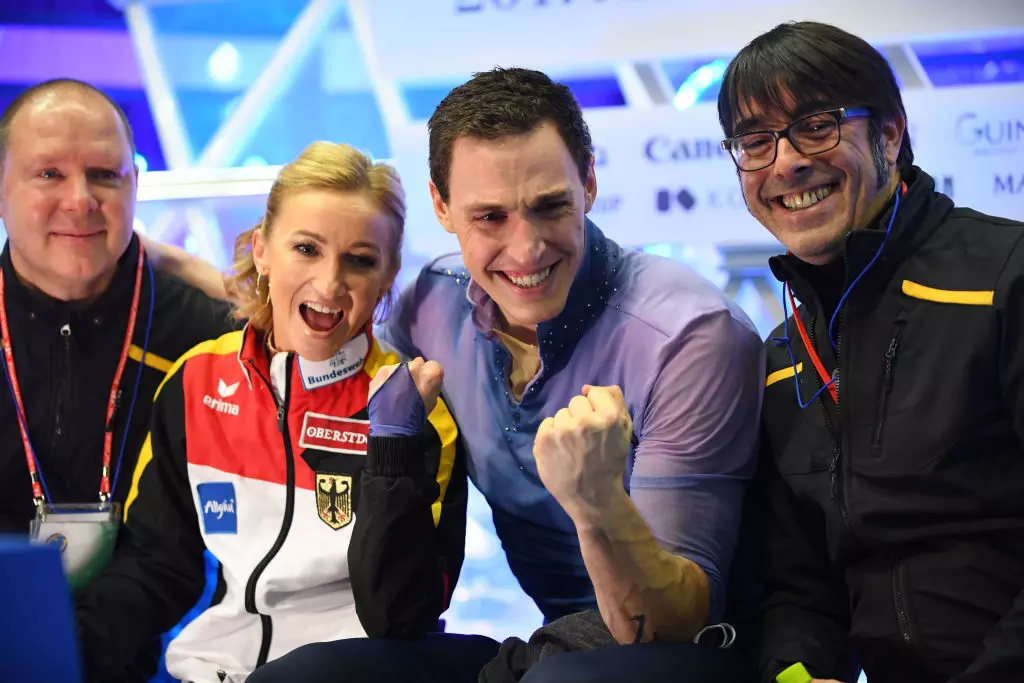
Q: You returned to last season’s Short Program the Lindy Hop “That Man”. How did that exactly happen?
A: Following the Grand Prix in Lake Placid, on the way home we discussed how we felt. I noticed that Bruno gives a 100 percent in the new Short Program (Flamenco), but it doesn’t come across the way we want it. I don’t like going back to something old, I prefer to do something new. I watched our Short and Free Program a thousand times, then I just watched the new Short Program and I was thinking what was missing. I was missing what we did last year, the action in the footwork, something that is unique and different. So I watched the old short, although I didn’t want it. I fought with myself and then I thought, yes, it is much better. We never skated it clean last year and I wanted to see it without any mistakes. I thought with the throw triple flip we can skate clean. On Wednesday (after Skate America) we came to practice and I said ‘I have a suggestion’. I was afraid to say it, because it was three days before we left for the Final and I didn’t know if he (Bruno) can switch so quickly to another program and it has to work for both of us. I said to Alex (Alexander König, coach) ‘I don’t know how to ask …’ and Alex said ‘Bruno, Aljona wants to say something. What if we do the old Short Program?’
B: He didn’t finish the question when I already said yes. We talked about changing the Short Program before. However, to mount a program means a lot of work and it would be complicated for the Olympic Games. I suggested to take this program in which we really explode and feel so much better. Choreographically, the theme is much broader than the Flamenco which has only the same movements. Therefore, I thought it was a good idea and I agreed right away.
Q: When did you think for the first time about reusing the Lindy Hop program?
B: Already in March (laughs). No, I wanted to do a new program, but I just loved that (Lindy Hop) program.
A: We’ll see. Maybe there will be something new after all. You can expect anything from us.
Q: Well, yes, we saw that in the short program when first the zipper of your dress broke and then Bruno’s lace ripped. Bruno, did you not notice that the lace was on the brink of ripping?
B: During the six minutes warm up I noticed that it felt loose and I thought I have to retie it. I saw that the lace looked weird, but there was no time to change it. So I retied and the program started. The triple twist was perfect, triple Salchow and I realize something is wrong. We do the throw triple flip and I tell Aljona that my boot is broken. She thought I wanted to stop, but I just wanted to warn her in case something seems off for her. She just told me ‘go, go’.
A: Yes, I thought he was going to stop when he tells me that his boot is broken. But I said, go on, no matter what.
B: I knew you would say ‘go’. We finished the program and nobody really noticed anything. When I watched the video I thought you can see it, my twizzle in the footwork was almost on two feet.
A: It’s a shame but these things happen.
B: From now on I’ll always pay close attention to my lace and I’ll bring 15 spare pairs.
Q: At the beginning of your Free Skating you are forming the symbol of infinity with your arms. Whose idea was that?
A: That was basically my idea. I saw it in a ballet. I showed it to Bruno when we were mounting the Free Program. We started working on the long with Chris (Christopher Dean), but I didn’t feel so comfortable with the beginning. Bruno also didn’t feel comfortable and so we tried three different versions.
B: The beginning was difficult, but the symbol was beautiful.
A: I saw this symbol and I thought it suits the music and we can do it in an organic way. Bruno also thought it was cool, but it was hard, because our arms are different in length. We tried it in front of the mirror to see how it works best. We suggested it to Chris and he said, ‘yes, you can do it that way’. Eventually we did it how I wanted it to do. I like it when the beginning and the end of the program have a meaning.
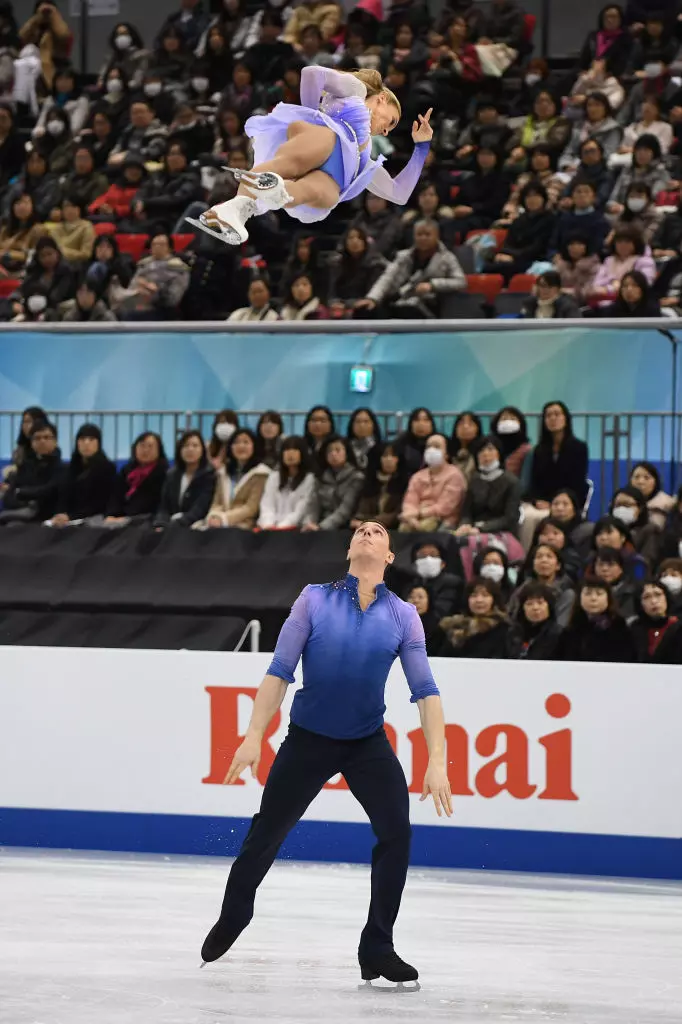
Q: You also changed the ending of your program.
B: We are never doing the same thing. We are still searching for the perfect ending. I think we have a good idea, but we are still thinking about it.
Q: So that means you are constantly developing the choreography of your programs yourself during the season. Why do you do that?
A: We are both creative people, Bruno as well as me and we just let it out. We have coaches that don’t stop us from doing that. When Bruno or I have a feeling or think of something, we suggest it and we try it. Nobody blocks that and therefore we can continue to develop. The best thing is when an athlete feels something himself and tries it, you can sell it better than when you just act. You can do it perfectly when acting, but it doesn’t come from the inside. We are always searching for something, it is a continuous process.
B: It is teamwork. We share our ideas, we form them together and it works this way.
A: I am always watching videos of our performances. The starting pose (in Nagoya) was good, but it has to be more organic.
B: We changed that beginning two days before leaving for Japan. Now we have to work on it to make it perfect and the movement more fluid. We actually never have the same program, there is always something different.
A: It was the same when we did our show program, we have that kind of feeling and it is easier when we both feel the same way and our coaches as well. It is never ending. It is fun and you are growing, doing always something new. It is like creating a painting together.
Q: Will you work again with Christopher Dean before the Olympic Games?
A: We would like to do something with him again, but there is not much time. I think he doesn’t have much time either. We have enough material to work with. If the opportunity arises, we’ll gladly use it, but if not, we take what we learned from him and continue with that. We are watching videos what we can improve. We actually did a lot of different things but not yet in the programs. We’ll see.
Q: You also have that original exhibition program “Up All Night” with many innovative elements. How do you find those?
A: For example the spin. We are spinning and I said ‘can you lift me? I think that could look great?’ And we just try it. It comes naturally.
B: Yes, we’re doing that spin and I just lift her up. This is how it develops. We can show our creativity as a team in this show program, because we choreographed it ourselves. We had the idea going out from a video, but we did the choreography ourselves. We could do more with it. It is a shame that we cannot do something like this as a competition program, because many things are not allowed. We love this program.
Q: How has your partnership developed?
B: We’ve been skating together for almost four years now and we’ve gotten to know each other, but we still don’t know each other as well as do couples that have been skating together for ten years. Our practices are going very well, we’re working very well together and we are getting along very well on the ice. This helps us a lot to progress fast. If we didn’t get along, it would be difficult. We can work hard on the ice and have fun at the same time.
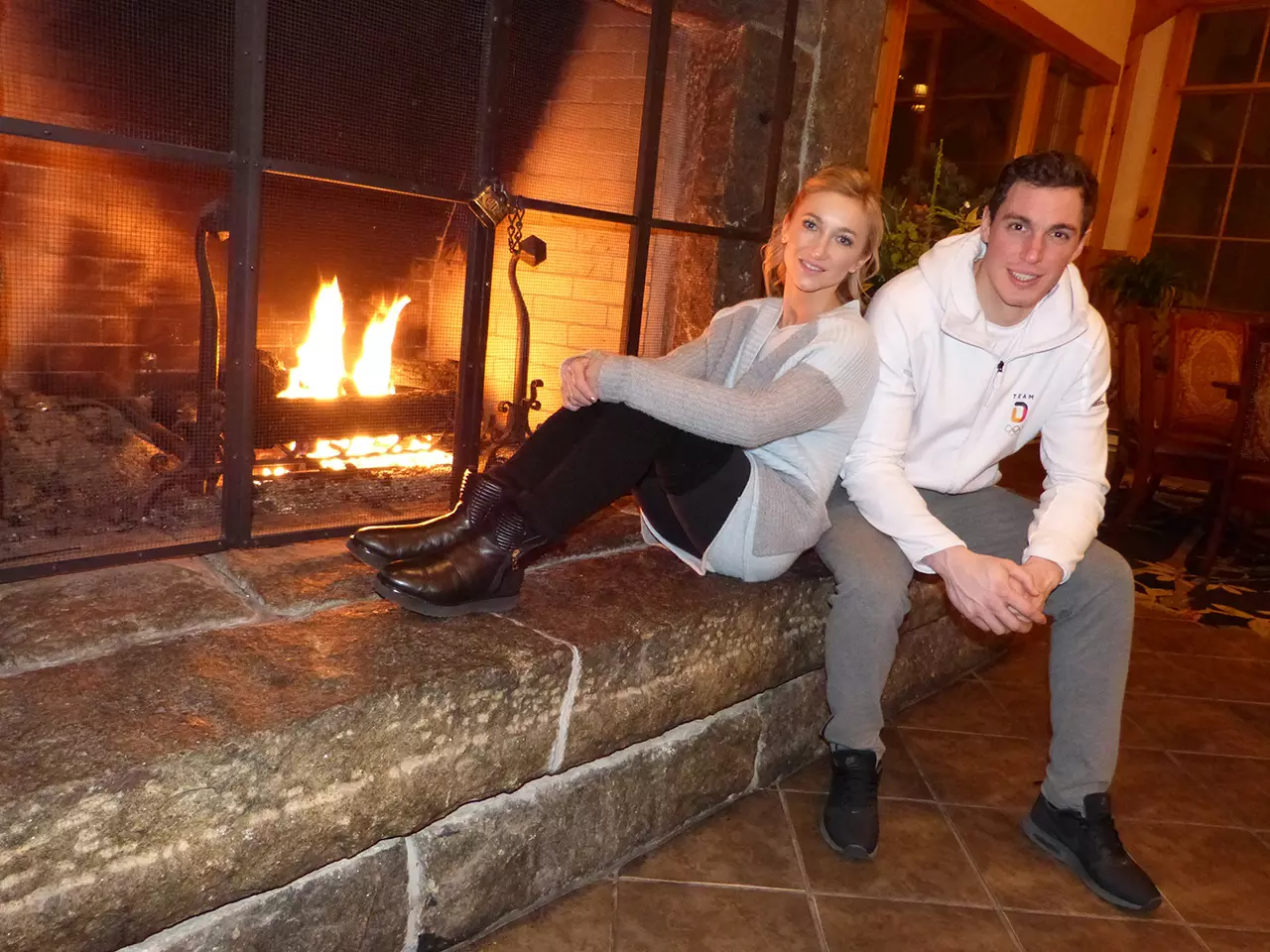
Q: When you started in spring 2014, many people did not believe in you. How did you deal with that?
A: Honestly, I don’t care what people are saying or thinking. I know that I can do it. If I believe in something myself, it is possible. Obviously, it does not happen by itself, there is a lot of work involved, but we believe in what we are doing and that gives us power, motivation and reassurance. Even people that didn’t believe in us at first believe in us now, but we have to do something for it and we need to believe in that project ourselves and that we can achieve it.
B: I am living my own life and my career and you cannot listen to these people. I think these are people who are afraid of something. They are someone’s fans and they are afraid that we can be better. There always have been people that supported us and others that didn’t. We don’t pay too much attention to that.
Q: Probably for you it was not that easy to step out of the shadow of Aljona who has been so successful and famous while you were the new guy.
B: I had a lot of work to do and I still have. I still have two months to work hard. However, I think I am on a good way. If you watch our programs now it is quite good. Obviously I have a lot of respect for her. When we started out together, I told myself, I will do my best and take the maximum out of it. Yes, she has more experience than I have and I am trying to learn as fast as possible to reach that level. I am collecting the maximum of experience. I didn’t want to be afraid, that doesn’t help me. It is a great experience for me and I give everything I have.
Q: Do you even need a quadruple throw or twist or a triple throw Axel?
A: That is a difficult question. We’ll do what we can manage.
B: We’ll do in the program only elements that we can do safely. In order to win we need a clean program.
A: If we can do it, we will.
B: If we think it is a risk, we won’t do it. If we go out on the ice with the feeling that we can do everything it is easier to skate such a program than when we are thinking ‘oh my God, there is this element’.
Q: End of November you received German citizenship after passing that last part of the German language test. How did you find out exactly?
B: We were on the way to the airport (for Skate America) and when we just got there, Alex received a phone call from the administration in Sonthofen and they told him, ‘it’s done’. They wanted to see us, but it was a bit difficult since we were on our way to the USA. Therefore, we made an appointment for next Wednesday (after Skate America) and I got my papers.
Q: What did you think when Alexander König told you that you passed the test?
B: Alex first made a joke and told me – ‚you have to do another test‘. I said, ‘no, that can’t be, that’s a joke’. I was sure that I passed that last test. It was quite complicated; it is difficult in any language. I looked it up for French and I thought that is quite hard. However, that part that usually is the hardest for everyone is the naturalization test with question about Germany and the political system. That was not the hardest one for me, I passed it right away. Many Germans told me that it would have been difficult for them. I thought how can I manage that? The only solution I had was to learn the questions and answers by heart. I came to the exam and I passed, because I knew everything by heart. But it was good, I learned a lot about Germany. I knew quite a lot already, because I was interested in history when in school, but I still learned a lot and it is great to get to know another language and another culture. I am sure it will be an advantage for me later on.
Q: You are able to keep your French citizenship, aren’t you?
B: Yes, I can keep the French passport and I have double citizenship now. I will have it for my whole life. It is a big plus for me.
Q: Thank you for the interview and all the best for the rest of the season.
